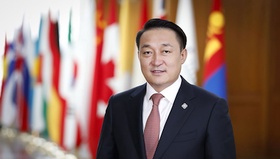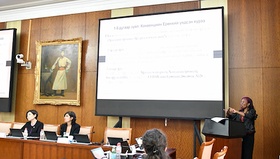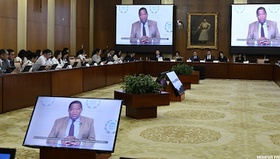Prime Minister of Mongolia, members of the Parliament, members of the Government, academics who have accepted our invitation, wish you peace this morning and wish you a happy New Year.
At a time when there is a "tectonic shift" in the world politics and economy, we have said goodbye to a year that faced difficult economic and social challenges for Mongolia and welcomed the new year 2023.
Difficulties and challenges will not go away easily. It is likely to continue in the new year and for a certain period of time. But new opportunities will open up. It is a historic time to take advantage of this opportunity and take new steps towards the future. Therefore, the Parliament decided and issued a resolution to organize a consultative poll on the topic "Let's solve it by consultation" in order to identify the most urgent problems in the country and find an optimal and quick solution. For this purpose, we believe that it is appropriate to meet the consensus of the entire society, including academics, citizens, civil society, politics, and business circles, and discuss the issues. For this purpose, we believe that it is appropriate to meet the consensus of the entire society, including academics, citizens, civil society, politics, and business circles, and discuss the issues.
Distortions in the political and governance system, the weakening of the capacity of the public service, and the deterioration of the responsibility and ethics of government officials have become sensitive issues that affect the entire society. Wealth theft, corruption, official crime, social inequality, stark disparity in income and living standards, unemployment and poverty are disturbing the people. Wealth theft, corruption, official crime, social inequality, stark disparity in income and living standards, unemployment and poverty are disturbing the people. It is high time to correct and improve the problems that have accumulated over the years, such as inefficient economic policies, over-concentration, environmental pollution, and road congestion. It has already become clear that it is impossible to move forward without "cleaning up" these problems that are stifling development, shadowing the future, and upsetting our citizens.
Therefore. This academic conference is being organized as part of the preparation for the consultation poll. At this conference:
1. problems of political and governance relations;
2. demand for accountability system and justice;
3. decentralization and congestion reduction;
4. wealth fund, fair and accessible distribution
academicians will give presentations on 4 of these sets of topics, and discuss each aspect in 4 sessions. The main purpose of the meeting is to listen to your opinions and thoughts as widely as possible and to clarify the scope of the issues for consultation with the people. Now, let me briefly share my thoughts on the main topics to be discussed.
First, political and governance issues.
In this context, there are both achievements and accumulated mistakes over the past 30 years. Therefore, first of all, we should seriously consider whether the 1992 Constitution and the 2019 amendments have been fully revived and implemented.
With the new Constitution, we have irrevocably moved to the natural path of common human development. Our country's sovereignty, independence, democracy, human rights, freedom, parliamentary rule, executive power, independent judiciary, and local government system based on self-governance are the values of the Constitution.
Do not hide the lack of opportunity to confidently say that the values declared by the Constitution have been fully protected and pursued.
In 2020, the Parliament approved the resolution "On the harmonization of legislation with amendments to the Constitution of Mongolia and measures to be taken in connection with it". In the annex of the resolution, more than 30 major laws are included for new approval, 17 laws have been approved and 3 laws are in the discussion stage. Let's say right away that the progress of legal reform is not as expected, despite certain results.
For example, the laws on the financing of the President of Mongolia, Political parties, and Political parties, which are very important for strengthening the control and balance between state powers, parliamentary democracy, and the people's right to rule, have not yet been submitted.
Our political parties are considered by the public to be a platform for a group of people to rise to the position, a nest of open conspiracies for power, a tool for corruption and profiteering, and the main source of the decline of the government system. It should be recognized that our electoral system is not the country's expression of the interests of one constituency or one member, but the fact that citizens dictate the votes of the voters and encourage those who have money or can be more corrupt, in turn leads to the undermining of the people's right to govern.
There was an inevitable need to significantly change the Law on Political Parties, adopted twenty years ago, in line with the interests of the country and the people, as well as global trends. Of course, we will not back down from our parliamentary government, where laws and decisions are made on behalf of the great people, and decisions are made after discussions, and the activities are more transparent in the eyes of the citizens. But there is an inevitable need to develop the classical parliamentary government in its true sense.
Second, the demand for accountability and justice.
According to the results of public opinion and research, it is clear that the main reason for lowering the reputation of the government, weakening the capacity of the civil service, and thus destroying the trust of the citizens in the government is related to the loss of the system of discipline and ethical norms.
The accountability system should be based on legal, political and ethical norms. However, in our country, the unified system of political and ethical responsibility of senior government officials, government officials at all levels, state-owned companies and legal entities has basically disappeared. There are a lot of approved laws, but law enforcement agencies themselves violate the law, they cannot act independently of politics, positions, power, color and money factors work, and they even initiate and decide cases on orders. It leads to the root principle of equal rights for every citizen.
Corruption and official crimes are not decreasing. The amount of money behind such cases will be discussed in billions and trillions instead of millions. One of the reasons for people's frustration is that the process of solving and holding people responsible for major crimes that have attracted public attention is slow, and the fact that the decisions are not commensurate with the damage caused. The sentencing policy for this type of crime should be strict. In addition, it is believed that it is time to create an effective and stable system of ethics, discipline and responsibility.
Reforming the political party financing system and introducing the principles of good governance through the Law on State and Locally Owned Companies and keeping them independent from politics will be an important step to strengthen accountability.
The rule of law and accountability system will prevail in the Mongolian government, and it will be implemented fairly, in short, the people's trust in the government will be restored. In other words, we can respond to people's demands for justice only by applying the principle that the law applies to its citizens equally and fairly, and the principle that there is sure to be responsibility for wrongdoing.
Third, the issue of decentralization and decongestion.
Over the past 20 years, we have talked about regional development and decentralization. Many policies and programs have been approved. However, few have actually been implemented and achieved results.
More than 50% of the population lives in Ulaanbaatar, the capital city of Mongolia, which is 0.3% of the total area of Mongolia, due to the failure to use the findings of modern science on spatial planning and implement effective policies at the national level. The gap between urban and rural areas has increased, and the trend of desolation of Mongolia's countryside has continued.
Urban planning policy is lost, chaotic land allotment reeking of corruption, congestion due to overcapacity of infrastructure, air and soil pollution adversely affect the quality of life of citizens and are a major cause of frustration.
The cost of opportunities lost due to the concentration and congestion of Ulaanbaatar alone is estimated at 3.8 trillion MNT per year. One citizen of the city spends an average of 30 days a year in traffic jams, loses his job and suffers.
We hope that many new ways and solutions will emerge from today's meeting on how to solve this LOCKING factor and the LOCK that has hindered development through new spatial planning, what levers of law, law and policy to use, in what order, and how to bring it back to life.
Fourth, wealth fund and fair and inclusive distribution.
According to the results of household and socio-economic surveys, the consumption of citizens of the low-consumption group in our country is 5 times lower than the high-consumption group. The poverty rate has not actually decreased.
It is definitely a serious problem that the underground wealth, which should be under the control of the people and the income from it should be devoted to the development of the country and the welfare of its citizens, is concentrated in the hands of a few people and in the hands of an oligarchic group intertwined with outsiders.
The trend of dividing society into two groups: the super-rich minority and the poor and the majority sliding into poverty has intensified in recent years. The possibility of increasing the middle class, which is the main pillar of the country's development, is still limited.
Income inequality and unemployment are other causes of poverty. For example, in the past 30 years, the industrialization policy was basically abandoned. As a result, unemployment increased and household income decreased. It has become too dependent on the mining sector, the variety of export products has not increased, and it has been relying on a few minerals for a long time. Processing industry is not developed. We have not been able to implement significant policies and sustainable activities to support the processing and export of animal products that are closest to us. Many such reasons can be named.
Why has the country, which is the richest in the world, has a fertile and vast territory, has more than 71 million animals, and has a population of just over 3.4 million, today? People are rightly asking the government that question. We have to answer that.
In 2019, the amendment to the Constitution of Mongolia defined the principle of equal and fair distribution of the benefits of subsoil resources to the National Wealth Fund. However, three years later, the draft law on the National Wealth Fund was not submitted.
If Mongolia has a lot of natural resources, it should have a wealth fund. It should become an incentive for development. The people deserve to receive the benefits of their wealth equally and fairly. This is the world standard. It is by this standard that we must go. There is no other way. Let's find a way to make this path transparent and straight.
Scientifically calculating and summarizing the common aspirations of our citizens, who are the lifeblood of democracy, and putting them into practice as state policies is an important requirement for the goals of revival and development, and the support force for ensuring the people's right to rule.
Therefore, the "core" or main problems facing politics, society, and the economy, and the "subsequent" problems arising from them have different boundaries, but they need to be considered together and approached using a scientific method. By determining the social, economic, and political causes of the "core" problems that are becoming more apparent due to the resulting difficulties, the "secondary" problems and their priority order will be determined.
I believe that you will be aware of the honorable responsibility of determining the direction of the revival of your country, and that you will take an active, proactive and business-like participation in the meeting, fully understanding that you have a noble responsibility to solve the riddle of important problems "in consultation with the people".
I wish you success in the Conference.

 Eng
Eng  Монгол
Монгол

